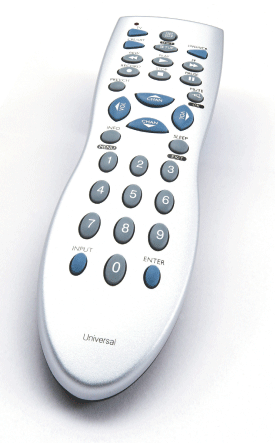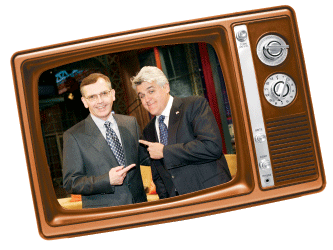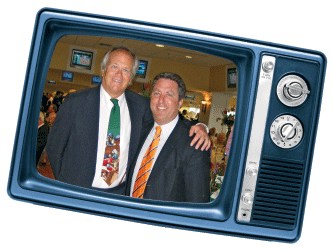
 NBC execs Rick Ludwin ’70 and Jon Miller ’78 fine-tune entertainment and sports on the Peacock Network. NBC execs Rick Ludwin ’70 and Jon Miller ’78 fine-tune entertainment and sports on the Peacock Network.
By John Kiesewetter
Johnny Carson. John Madden. Bob Hope. Bob Costas. Jerry Seinfeld. Jay Leno. Al Michaels. Mike Myers. Dick Enberg. Chris Rock. Will Ferrell.
Some of the biggest names in TV entertainment and sports broadcasting have found themselves working with — or for — two Miami University graduates, Rick Ludwin ’70 and Jon Miller ’78.
Ludwin, with NBC since 1980, is the NBC Entertainment executive vice president for late night and primetime series. He oversees “The Tonight Show with Jay Leno,” “Late Night with Conan O’Brien,” and “Saturday Night Live” — plus has helped develop some primetime shows, such as “Seinfeld.” He has supervised late night since 1989, when America went to bed watching Carson and David Letterman on NBC.
“I wasn’t Johnny Carson’s boss,” says Ludwin, 58, about one of TV’s icons. “He didn’t have a boss. I was his ‘network liaison.’ I worked with him.”
Miller, 50, NBC Sports executive vice president, oversees 550 hours of NBC Sports programming — the NFL, NHL, golf’s U.S. Open Championship and PGA Tour, Wimbledon, the Kentucky Derby, and Notre Dame football. He started with NBC several months after graduating from Miami, working as a salesman at WRC-TV in Washington, D.C., and later NBC Sports. He moved from sales to sports program planning and development in 1988.
Both men have enjoyed long, successful runs in an industry where people often have short-lived careers. “It’s very rare, certainly,” says William Utter, retired Miami University director of broadcasting, a professor emeritus of communication, and longtime friend of Ludwin’s.
“Isn’t it something that these two Miami graduates have gone on and accomplished so much at NBC, from this little red-brick town,” says Wayne Staton ’70 MBA ’71, an Oxford attorney and an associate business professor at Miami. He had Miller — who does a great Groucho Marx impersonation — in class, and they remain good friends, talking every few months.

Rick Ludwin’s office walls at NBC Entertainment headquarters in Burbank, Calif., are lined with photos of the famous “Tonight Show” hosts: Steve Allen, Jack Paar, Johnny Carson, Jay Leno.
But his prized possession is the framed TV Guide page behind his desk. Listed in the Jan. 25, 1968, highlights — opposite Sally Field’s “The Flying Nun” on ABC and Gene Kelly in NBC’s “Jack and the Beanstalk” — is Ludwin’s debut hosting “Studio 14,” a variety-comedy show on what was then Miami’s WMUB-TV (Channel 14).
Ludwin and his classmates wrote and produced the live show. Each broadcast showcased a comedy sketch, interview, and a performance of some sort — TV’s traditional variety formula popular throughout the ’70s, which now exists in the late-night world he manages.
“I had this love for live television. There was nothing more exciting,” says Ludwin, NBC Entertainment’s longest-tenured employee. After earning a master’s degree at Northwestern University, he worked for Chicago and Detroit TV stations, and then for the national “Mike Douglas” talk-variety show. He was hired in 1980 as director of variety programs by NBC Entertainment President Brandon Tartikoff — whom he met while both worked at WLS-TV in Chicago.
 His “Studio 14” experience gave him a feel for the variety format as he worked with Carson, Leno, Letterman, O’Brien, and “SNL.” He was the only NBC executive accepted into Carson’s inner circle for the brief pre-show meeting behind “The Tonight Show” curtain before each taping. His “Studio 14” experience gave him a feel for the variety format as he worked with Carson, Leno, Letterman, O’Brien, and “SNL.” He was the only NBC executive accepted into Carson’s inner circle for the brief pre-show meeting behind “The Tonight Show” curtain before each taping.
“Johnny was always gracious to me. I could do a Bob Hope imitation, and he’d like to hear me do it. To get Johnny Carson to laugh, that was really great,” says Ludwin, who remained in touch with Carson until his death in 2005. “I found out later that I was one of the few people he’d talk to before the show.”
Ludwin’s comedy instincts helped launch and nurture “Seinfeld,” one of TV’s greatest sitcoms. Jerry Seinfeld’s quirky comedy pilot, called “The Seinfeld Chronicles,” debuted July 5, 1989, while Ludwin was visiting in Oxford. He recalls buying a Chicago Tribune uptown the next day and reading “a pretty good review” that encouraged him to buck his bosses and order four more episodes for summer of 1990. With a year to tinker, Seinfeld and co-creator Larry David made the crucial decision to add a female to the ensemble, Julia Louis-Dreyfus as Elaine. By 1994, “Seinfeld” was TV’s No. 1 show.
Ludwin often tells his true Hollywood story about “Seinfeld” when he returns to campus each October. For 25 years, he has given a TV insider talk to students about “SNL,” Leno, O’Brien, and others, and showed rare video such as Conan’s 1993 audition tape. (Ludwin’s NBC contract has been extended to 2010 so he can oversee O’Brien’s replacing Leno on “Tonight” in two years, as he did NBC’s transition from Carson to Leno.) His show business connections helped bring Leno and Hope to Miami Parents Weekend concerts.
Every July 4th, Ludwin escapes network TV pressures for a steak sandwich at Mac & Joe’s and dinner with the Utters. (This year he attended a “Studio 14” reunion that holiday.)
“I drive down there (from Cleveland) for a day every summer. I roll down the windows and turn up the radio. It’s very cathartic,” says Ludwin, who awards four scholarships annually to Miami students and helps finance another scholarship in Utter’s name.

Jon Miller is calling from a family vacation in Aruba, where the hotel gift shop downstairs has stacks of Slamball paddles.
Slamball, the Israeli beach game played with a hollow paddle and rubber ball, is what helped put Miller through Miami. He sold the simple game to retailers and distributors across America while earning his business degree.
“He’s one of those people when you first meet him, you know he’s going to be a real go-getter and make something out of his life,” says Judy McDowell Staton ’69, Wayne’s wife.
Selling Slamball — and his experience with Miami’s Laws, Hall & Associates student advertising practicum — have served him well in 29 years at NBC.
Miller switched from NBC Sports sales to program planning and development in 1988, months before the network lost Major League Baseball rights after 40 years. NBC lost NFL rights after Super Bowl XXXII in 1998. The NFL returned to NBC on Sunday night last fall after “eight very long years,” says Miller, who has worked since 1989 for Dick Ebersol, now NBC Universal Sports and NBC Olympics chairman. He calls Ebersol “an unbelievable teacher, mentor, and friend.”
To fill the weekend programming void, Miller created NBC Sports Ventures unit to find new events — a father-son golf challenge, pro volleyball games, the Dew Action extreme sports tour, and National Heads-Up Poker Championship. NBC owns all of these entities, cashing in on event attendance, merchandising and cable, international and Internet rights — instead of paying rights fees to a league.
“When you pay rights fees, all you’re doing is renting the program,” Miller says. “If you own a property, you can’t ever lose it. You won’t be in the position of making a property valuable — as we did with Major League Baseball for 40 years — and then have someone take it away from you.”
His entrepreneurial instincts have literally led NBC to the dogs. After watching “Best in Show” with his wife, Jan, also a 1978 Miami grad, Miller asked the Kennel Club of Philadelphia if he could begin televising its annual meet. The 2002 “National Dog Show” premiere drew four times the projected audience.
“Everybody was shocked. But it’s a family-friendly show that fits nicely after Macy’s Thanksgiving Parade, and then people can watch football,” he says.
 Miller also makes several trips a year to Oxford to serve on business, alumni, and athletic committees. He has another reason to come back — to see son Jeff who graduated May 6 (a day after Miller personally supervised NBC’s Kentucky Derby coverage in Louisville). Son Robby will be a Miami freshman this fall. Miller also makes several trips a year to Oxford to serve on business, alumni, and athletic committees. He has another reason to come back — to see son Jeff who graduated May 6 (a day after Miller personally supervised NBC’s Kentucky Derby coverage in Louisville). Son Robby will be a Miami freshman this fall.
Miller, who came to Miami thinking about playing varsity tennis, never dreamed of being a TV sports executive. He just wanted an East Coast business job somewhere.
“I loved to watch sports. I loved to play sports. I loved to sit in a bar and argue about sports. I never, ever knew this would be the path I’d end up on. I’ve been very blessed to have this career.”

One, two, three. ABC, CBS, NBC. There were only three commercial networks when Ludwin and Miller attended Miami in the media Dark Age.
“There was no real cable TV. No superstations. No satellites,” Miller says.
No ESPN, CNN, or MTV. No Internet. No cell phones. No BlackBerrys.
So what will TV look like when Miller’s grandchildren go off to college? Or when NBC turns 100 in 2026?
“YouTube,” says Ludwin.
Networks could release new shows weekly — like the way magazines arrive at a bookstore — and not in a set primetime lineup, with shows airing in competing time slots.
“Kids today have their own primetime with YouTube. They watch what they want to watch, and when they want to watch it,” Ludwin says.
He is optimistic that “Today,” “Tonight,” and “Late Night” will continue to produce daily programs. “Game shows, westerns, movies have come and gone — and sitcoms have come and gone, and come back again — but late-night and early-morning TV have been a staple of television for decades,” he says. “I hope people will still want to have a laugh about what happened at the end of the day. That gives me hope the format will be around, even if the distribution system morphs into something completely different.”
Miller envisions a multitasking society accessing video from numerous places simultaneously — a TV, laptop, phone, and who-knows-what new devices. For major events, such as a Super Bowl, he thinks people will continue to gather for a shared experience.
“TV will continue to be a very important part of our entertainment landscape,” Miller says.
John Kiesewetter is The Cincinnati Enquirer TV/media writer.
 Back to the Miamian Magazine Summer 2007 Web page Back to the Miamian Magazine Summer 2007 Web page
|